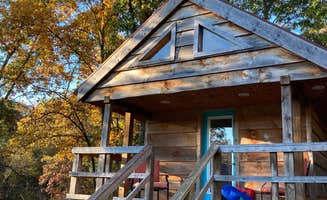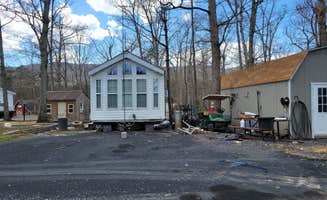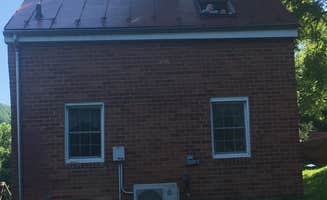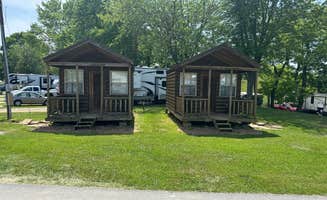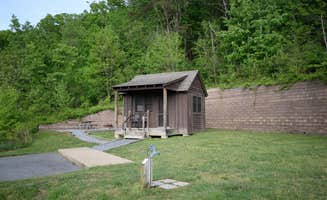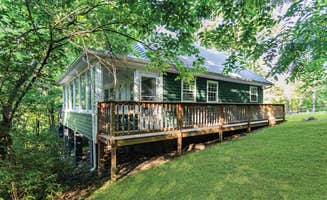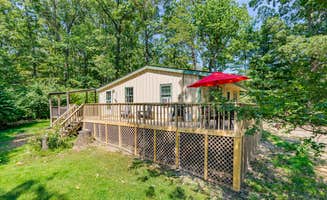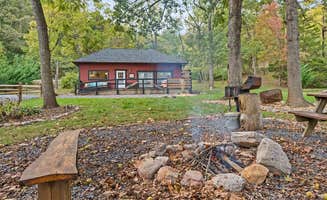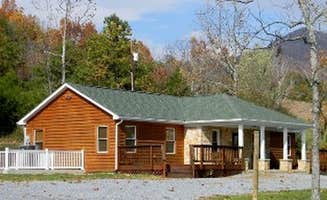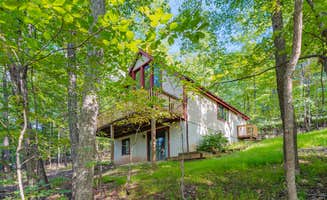Cabin accommodations near Middletown, Virginia range from primitive sleeping quarters to luxurious woodland retreats across several state and private parks. The region sits at the northern entrance to Shenandoah Valley, with elevations between 500-1,000 feet creating distinct seasonal camping experiences. Winter temperatures routinely drop below freezing while summer highs consistently reach the upper 80s with significant humidity.
What to do
Fishing access points: Low Water Bridge Campground offers direct fishing opportunities from riverside campsites. "The primitive spots are right next to the river. Great fishing and swimming right at your camping spot," reports Matt P., highlighting the convenience for anglers without needing to hike to fishing locations.
Trail exploration: The Cove Campground features extensive trail networks suitable for both hiking and off-road vehicles. "Miles of off-road trails for atvs, jeeps, and dirtbikes," notes Jacob I., making it versatile for various outdoor enthusiasts who want both rustic camping and mechanized recreation options.
Wildlife observation: Big Meadows Campground in Shenandoah National Park provides excellent wildlife viewing opportunities directly from your cabin site. "We saw many deer and bear while camping," shares Rachel M., adding that the night sky offers exceptional "star watching" conditions due to minimal light pollution throughout the park.
What campers like
River-based activities: Low Water Bridge Campground receives consistent praise for its river access and float trips. One camper explains the convenience: "They have an outfitter to shuttle you up the river. We got a site right on the river bank so we just hopped out and were at our site!" This allows for seamless paddling experiences without complicated logistics.
Farm animal encounters: Spacious Skies Shenandoah Views (formerly Luray KOA) offers a unique feature where domestic animals graze near campsites. "Adjacent to a working farm where cows, sheep, llamas, chickens and roosters can graze next to the campsites," according to Erika S., creating an agricultural experience alongside traditional camping.
Shooting facilities: Cabin campers seeking recreational shooting can access designated ranges at certain campgrounds. "With great trails, a lake, and outdoor shooting range we can easily spend the whole weekend or longer," notes Victoriana P. about The Cove Campground, highlighting activities not commonly found at standard campgrounds.
What you should know
Reservation policies: Many campgrounds require phone rather than online bookings for cabin stays. "You have to call in your reservations - can't book online," explains one reviewer about Low Water Bridge Campground, indicating potential challenges for last-minute planners accustomed to digital booking systems.
Cell service limitations: Most cabins in the region have limited or no cellular connectivity. "There is absolutely no Verizon service here (ATT seems to work pretty well). You'll have to drive 10-15 minutes in either direction on Rt. 211 before you can catch a signal," warns one camper at Low Water Bridge.
Bathroom configurations: Big Meadows Campground offers varied toilet facilities depending on cabin location. "Bathrooms were plentiful, heated, hot running water, and a utility sink available," notes Carol B., adding that "showers and laundry were closed for the season but are centrally located near entrance area of campground," indicating seasonal limitations on amenities.
Tips for camping with families
Activity planning: Yogi Bear's Jellystone Park specializes in family-oriented programming throughout the season. "They have a nice pool, 2 playgrounds, neat bikes you can rent, golf cart rentals. Best of all, they sell bags of special stones and fossils for you to mine. My boys had a blast with that!" shares Leanne B., highlighting structured activities for children.
River safety precautions: When booking riverside cabins, consider current strength for families with young children. "The current can be strong, so be mindful of the river level," cautions a reviewer about Low Water Bridge Campground, suggesting parents should assess water conditions before allowing water play.
Outdoor educational opportunities: Many cabins near Shenandoah National Park provide access to ranger programs. "Nice amphitheater with interesting ranger programs," mentions Kim L. about Big Meadows Campground, offering structured learning experiences that supplement cabin stays without additional cost.
Tips from RVers
Electrical configurations: Candy Hill Campground maintains specific RV certification requirements that affect cabin campers with modified vehicles. "My bride & I roll in a DIY Class B (2017 For Transit High Top & Extended Length). It is VERY WELL MAINTAINED inside & out... Candy Hill only wants RVs that are RVIA Certified," warns one visitor, indicating potential restrictions for non-standard vehicles.
Site leveling challenges: When transitioning between cabin stays and RV camping, note that some campgrounds have terrain issues. "The only reason it didn't have 5 stars was our site was not even close to level. It probably shouldn't have been available for a 40'+ RV," reports Jen O. from Jellystone Park, suggesting careful site selection for mixed accommodation trips.
Water connection options: Shenandoah River State Park and similar facilities may have limited water hookup points in certain sections. "There are 4 water spigots in camp 1. However all the travel trailers hooked up, which means you either had to make friends or disconnect their water in order to have access," notes Christopher K., highlighting potential resource competition during peak seasons.


